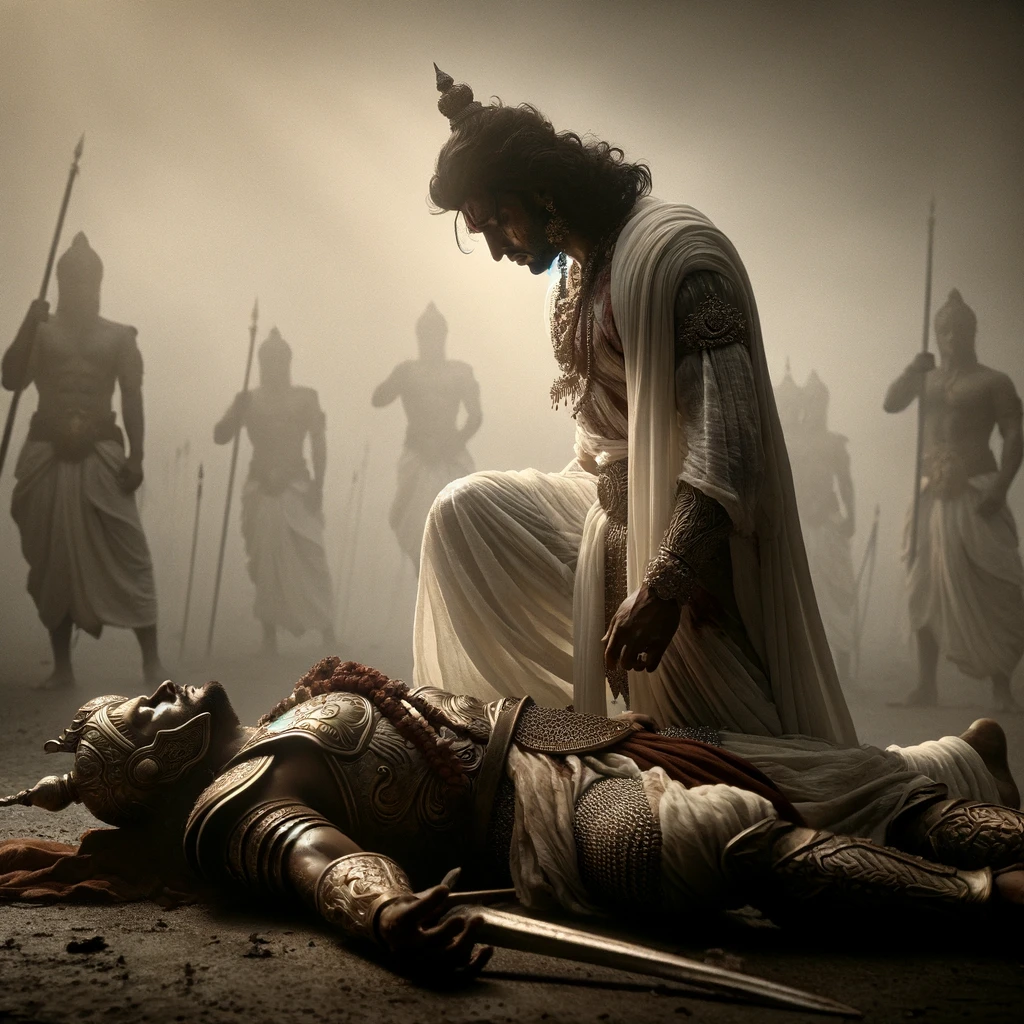When Vibhishana saw his elder brother lying dead on the battleground, he began lamenting due to his mind’s being overwhelmed with grief: “O renowned and valiant warrior! You are clever and skilled in politics. Since you are accustomed to lying on an exquisite couch, why are you lying dead on the ground? Having thrown about your big arms adorned with bands, they are now still. Your crown as brilliant as the sun has been knocked off and is shaking slightly. O Warrior, that which I previously warned you about has occurred because, being overwhelmed with lust and delusion, you did not like that advice. This calamity has occurred because out of pride Prahasta, Indrajit, Kumbhakarna, Atikaya, Narantaka and others did not think much of my advice. O best of those who wield weapons, now that you are dead on the ground, the boundary of those practicing self-restraint is gone, along with the personification of virtue. The repository of strength has vanished, along with the refuge of the dexterous warriors. The sun has fallen on the ground. The moon is overcome by darkness. Fire does not flicker with flames. Determination has no energy. Now that Ravana, the tiger among rakshasas, is lying in the dust of the battleground as if asleep, what is left for the people who have lost their strength?
“With firmness as its foliage, endurance as its exquisite blossom, austerity for its strength and valor for its firm root, the great tree of the king of the rakshasas has been felled on the battlefield by the wind of Rama. With ardor as its tusks, the family line as its backbone, anger as its legs and kindness as its trunk, the mad elephant of Ravana is sleeping on the ground, his body having been seized by the lion of the Ikshvaku Dynasty. With prowess and enthusiasm for its jumping flames, sighs for its smoke and his own strength for its heat, the blazing fire of this rakshasa has been extinguished on the battleground by the rain cloud of Rama. With rakshasas as his tail, hump and horns, lasciviousness as his ears and eyes, this bull of the rakshasas, who vied with an elephant in rut and could defeat all enemies, has been overpowered and slain by the tiger of Lord Rama.
As the grief-stricken Vibhishana was speaking these reasoned words which revealed his strong view of the situation, Rama said to him: “Ravana was not killed in combat because he lacked energy, for he possessed fierce prowess, very exalted enthusiasm and fearlessness. Those warriors who are killed on the battlefield seeking achievement do not need to be mourned, as long as they are fixed in their duties as Kshatriyas. This is not the occasion for grieving over one who has met with death when he had terrified the three worlds, including Lord Indra. No one has ever previously been exclusively victorious in combat. A warrior is either killed by his enemies or kills them in an encounter. Such indeed is the destiny proclaimed by the ancients as befitting a kshatriya. A kshatriya killed in battle does not need to be mourned. Such is the conclusion of scripture. Therefore, remembering this conclusion and sticking to truth without grieving, consider what needs to be done at this time.”
After Rama finished speaking, the grief-stricken Vibhishana said to Him something that was beneficial to his brother: “This rakshasa, who was never defeated by all the gods, not even by Indra, has been vanquished when he met You on the battlefield, as the ocean does when it reaches the shore. He gave charity to those who were due respect. He enjoyed royal pleasures and maintained his dependents. He bestowed wealth upon his friends and enmity upon his adversaries. He offered sacrifice in sacred fires, performed severe austerities, thoroughly mastered the Vedas, and accomplished deeds of exceptional valor. By Your mercy I wish to perform the funeral rites for my deceased brother.” After being addressed with these pathetic words by Vibhishana, Rama instructed him to perform those funeral rites which direct the deceased to heaven. Rama said: “Animosities end at death. Our purpose has been achieved. Let his final sacrament be performed. He is as much Mine as he is yours.”
Thus completes 109th Chapter of Yuddha Kanda of the glorious Ramayana of Valmiki, the work of a sage and the oldest epic.
Sriman Moola Rama Vijayate


